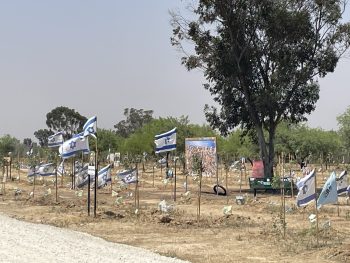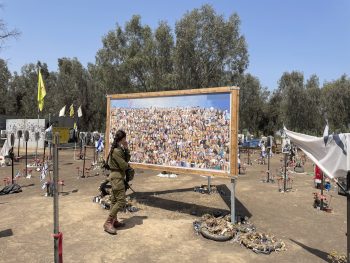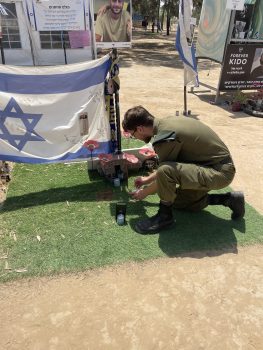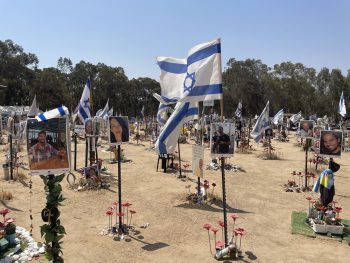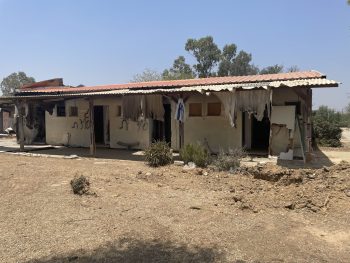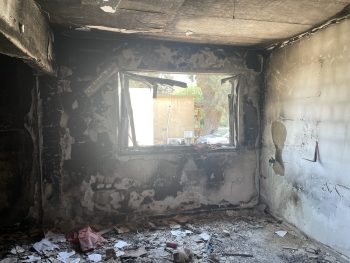From Solace to Sorrow
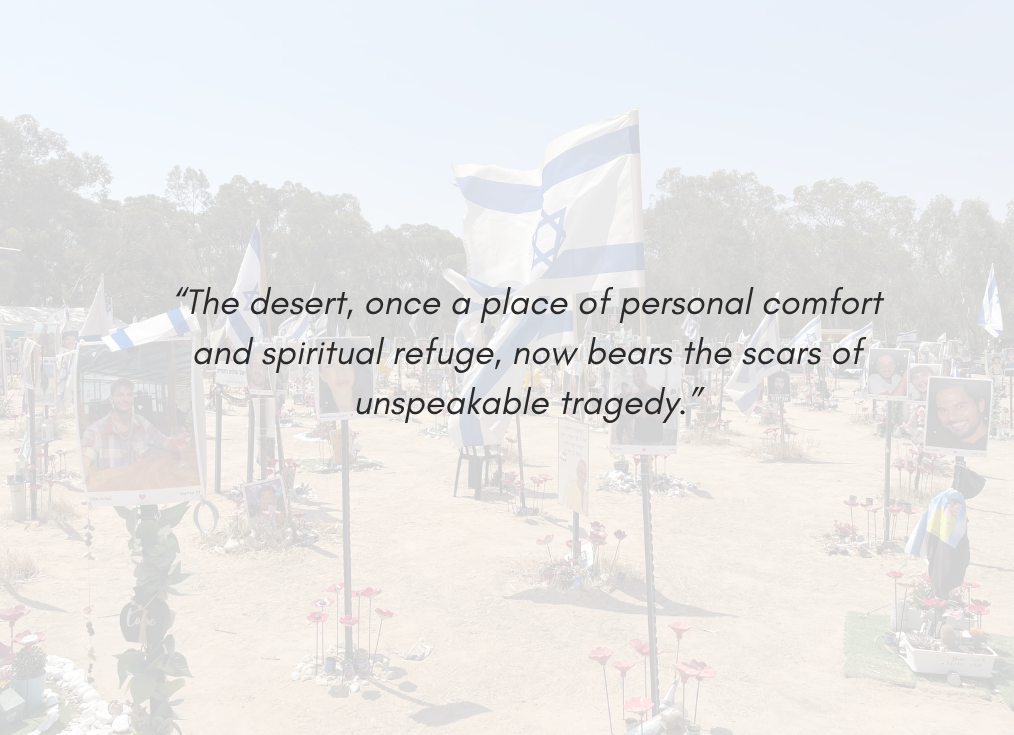
Sivan 1, 5784
In the desert, a vast expanse of solitude and silence, the Israelites embarked on a journey that would shape their destiny. In the opening words of Parashat B’midbar, “In the desert,” we read a profoundly resonating message, echoing a timeless human experience – the search for meaning amidst the harshness of life’s challenges.
Returning this week from Israel, which included a visit to the desert and the Nova Music Festival site, my perception of this sacred land was profoundly altered. The desert, once a place of personal comfort and spiritual refuge, now bears the scars of unspeakable tragedy. The crimes of 10/7 have forever etched their mark on this once-pristine canvas, forever changing the way I will interpret the phrase B’midbar, “In the desert.”
As I stood at the site where innocent lives were mercilessly taken, the desert no longer felt like an untouched realm of peace. Instead, it became a stark reminder of the cruelty and hatred that can invade even the most serene places. The visit to Kibbutz Nerim in Otef Aza further compounded this sense of loss, as we bore witness to the locations where residents were slaughtered and others kidnapped, their lives cut short and stolen by pure evil.
I want to thank our friends from the Kibbutz Movement for arranging this day, who are not only beneficiaries of the generous support from our community’s Israel Crisis Funds (ICF) campaign, but who are themselves passionate advocates for the kibbutz lifestyle that founded Israel and for the generational families who protect our homeland’s borders daily. There is a saying in Israel that if you turned off all the lights in Israel in the dark of night and then only turned on the lights at the kibbutzim you would see Israel’s borders.
…
Through the ICF campaign we are proud to support two vital projects facilitated by the Kibbutz Movement in the wake of the 10/7 tragedy. The first project aims to rebuild the human infrastructure that was decimated, ensuring that the agricultural needs of the affected kibbutzim are met. The physical loss and emotional toll of the attacks left the kibbutzim unable to tend to the land, threatening not only the livelihood of these communities, but the animals that need to be tended, and the agricultural infrastructure across Israel. By providing resources and support, this project seeks to restore the ability of these kibbutzim to thrive once more.
The second ICF-funded project focuses on advancing access to mental health resources for all kibbutz residents across Israel. The trauma inflicted by such senseless violence has left deep psychological scars, and it is crucial to ensure that those affected have access to the support and care they need to heal and rebuild their lives. These projects underscore the resilience and determination of the Kibbutz Movement, as well as the global Jewish community’s commitment to standing in solidarity with those who have suffered unimaginable loss.
For me, the Negev desert had always been a sanctuary, a place where I could find solace and connect with my spirituality. From childhood through adulthood, whether alone, with family and friends, or as a counselor for American Jewish day school students, the desert was a canvas upon which I could paint my dreams and aspirations. However, the events of 10/7 have forever tainted that canvas, leaving indelible stains of pain and suffering.
Today, eight months after the horrific events, the land still carries the open wounds of this tragedy. The victim and hostage families, along with their connected communities, continue to reel from the unresolved torture, their lives forever altered by a single act of senseless violence.
Even for those of us not directly connected to the victims, we cannot help but empathize and understand the metaphor of feeling alone in the desert, wondering if we will find our way out and be rescued from this nightmare experience. The desert, once a symbol of spiritual renewal, now serves as a stark reminder of the fragility of life and the darkness that can descend upon even the most tranquil of places.
In the face of such tragedy, we must come together as a community, supporting one another and finding strength in our shared humanity. Now, more than ever, we need to be part of a collective effort to heal and rebuild. We must embrace a renewed sense of responsibility, duty, and connection, ensuring that the memory of those lost lives serves as a catalyst for positive change and a commitment to creating a world where such atrocities are never repeated. This is why we are so incredibly grateful to all our ICF campaign donors for their generous support; without you we could not fund the efforts of all the amazing nonprofit agencies supporting the victims of 10/7.
As we traverse the metaphorical midbar (“desert”) of life, let us hold fast to the values of compassion, understanding, and resilience. Together, we can find our way out of the isolation, emerging with greater clarity and more united in our pursuit of a better tomorrow. Because we are…
Shabbat Shalom.


